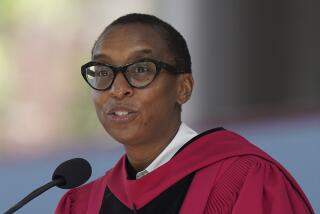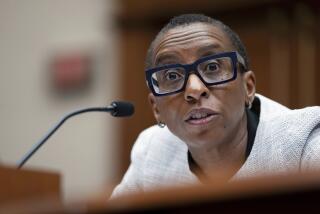Smith Faces Up to Its Reputation on Sexuality
- Share via
NORTHAMPTON, Mass. — At Smith College, it is the “L” word that makes campus officials uneasy. Its “identification with homosexuality,” as Smith President Mary Maples Dunn put it in a “statement on lesbianism,” comes up more often than many people would like.
Dunn issued the statement, which proclaims a doctrine of tolerance of all lifestyles, in response to persistent questions on the part of alumnae, applicants, parents, faculty and students at the 116-year-old institution.
“That’s always the question, the big question, I get when I visit my friends in California,” said Joyce Chiang, the 20-year-old president of the Smith College Student Government Assn. “They always say: ‘Oh, aren’t there a lot of lesbians there?’ ”
This suggestion is often heard in connection with an all-female college. But the fiercely loyal alumnae of Smith College--many of whom decry the mere mention of the word lesbian in association with their alma mater--give the issue special significance here.
“When asked about the lesbian problem, the alums will deny it up, down and backward,” said Sophie Godley, 20, political chair of Smith’s Lesbian-Bisexual Alliance.
“It’s the image that they’re worried about, the packaging,” Godley said. “They don’t want Smith to be known as a lesbian school.”
School officials say that women who graduated before 1970 are the most vociferous in their objections. “These are the women who made the choice to get their power from identification with men, from being wives of doctors or lawyers or whatever,” one campus official said. Since many of them have been among the most active in fund raising for their college, administrators at Smith worry that anxieties over lesbianism may result in decreased financial support.
But Lesbian-Bisexual Alliance President Satya Rhodes-Conway, 20, said the school’s discomfort also centers around concerns that the lesbian presence at Smith may discourage some women from applying. “The fear is that women will come here and be ‘converted,’ ” Rhodes-Conway said.
The lesbian issue at Smith raises other concerns as well. Barbara Reinhold, director of career development and director for planning and administration, added a political element to the discussion. She charged that linking the idea of lesbianism with same-sex education is damaging because it reflects a dangerous counter-feminist backlash.
“The ultimate weapon, the nuclear bomb to drop on women,” said Reinhold, “is the threat of lesbianism.” For many people, she said, sexual orientation “is the last OK prejudice in this country.”
President Dunn traced the roots of the controversy about lesbianism to the late 1960s and early 1970s, when “the great men’s colleges” began to shift to coeducation, and single-sex education began to appear “abnormal.”
Such abnormality, Dunn wrote in her statement, “was more easily linked with sexual activity or sexual identity” than with providing a place to pay “special attention to women and to their needs.” As a result, Dunn concluded, “the abnormal thing about same-sex institutions was quickly assumed to be homosexuality.”
“It’s germ warfare,” Reinhold said of the way this image of lesbianism has been attached to Smith and other women’s colleges. “And I think it causes institutional consternation because something that is so irrelevant to what we are trying to do here--which is to have women develop socially, academically and intellectually--can be used in such a powerfully negative way. It makes us sad that these noble goals are being tarnished by something that is absolutely irrelevant to the educational process.”
More to Read
Sign up for Essential California
The most important California stories and recommendations in your inbox every morning.
You may occasionally receive promotional content from the Los Angeles Times.













